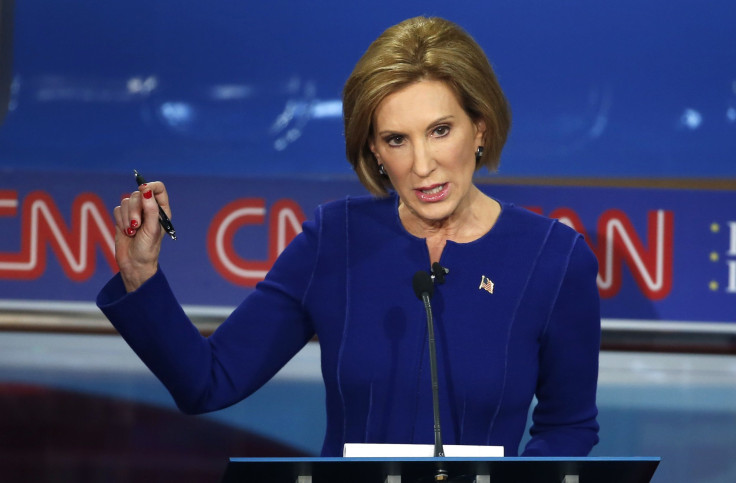Carly Fiorina Fact Check: She Did Double Sales At HP But The Price Was Profits, 30,000 Layoffs, Shareholder Value And Her Own Job

Hewlett-Packard this week said it would cut up to 30,000 jobs in addition to the 55,000 layoffs announced last year. The slash-and-burn campaign is the culmination of more than a decade of mismanagement at a once iconic Silicon Valley company that is now little more than an afterthought in a tech world that’s come to be ruled by innovators in cloud and mobile technology and social networks.
The most recent winnowing of HP was launched by CEO Meg Whitman, who unsuccessfully ran for California governor in 2010 before going back to her day job. Prior to Whitman, Mark Hurd, who was ousted in 2010 in the wake of a sex scandal and is now co-CEO at Oracle, oversaw the disastrous acquisition of tech services giant Electronic Data Systems.
But for many, HP’s path to near irrelevance began under the watch of Carly Fiorina, who is now seeking the White House as a Republican presidential candidate.
Fiorina’s pitch to primary voters? Her track record as a CEO and financial manager shows she’s fit to run the U.S. economy. “We doubled the size of the company,” Fiorina said of her time at HP, during Wednesday’s candidates’ debate. That, as a matter of record, is true. Fiorina led HP from 1999 to 2005, through which time total sales ballooned from $48.8 billion to $91.7 billion. But it doesn’t tell the whole story.
Growth, At A Price
The growth was almost entirely the product of HP’s $19 billion acquisition of PC and server maker Compaq, as well as buyouts of several smaller businesses. HP needed growth, and Compaq was a quick means to that end. Compaq brought popular brands like the Presario into HP’s struggling PC unit, as well as groundbreaking business computing technology like Tandem “Nonstop” servers.
Fiorina talked up the deal, consummated after a bitter proxy fight led by corporate scion Bill Hewlett, at the time of its announcement on Sept. 3, 2001. “At a particularly challenging time for the IT industry, this combination vaults us into a leadership role with customers and partners – together we will shape the industry for years to come.” It never worked out that way. The acquisition of Compaq ultimately saw HP, which counts among its inventions the LED, the first programmable calculator and the first commercial laser printer, become a bloated seller of low-margin, off-the-rack PCs that dragged down profits for years.
HP shares sold for about $100 at the time Fiorina took the corner office in Palo Alto, California, in 1999. When she left in 2005, they could be had for 20 bucks.
Some of it was just bad timing over which Fiorina had no control. HP’s plan to acquire Compaq was announced just eight days before 9/11. The terrorist attacks roiled the stock market and chilled tech spending in the years ahead. But HP’s integration of the merger was problematic almost from day one. HP and Compaq’s product portfolios had more overlaps than an origami swan, and internal battles over which lines to keep and which to shed sucked up management time and innovation stalled.
Brand Confusion
"There was a lot of brand confusion and there were problems with integration and execution," said Roger Kay, founder and president of research firm Endpoint Technologies Associates.
Ultimately, the merger was widely seen as one of the worst in the history of M&As, up there with stinkers like AOL-Time Warner and Sprint-Nextel. Over the course of her tenure, Fiorina axed about 30,000 jobs. In January 2005, HP’s board gave the GOP hopeful her walking papers.
The final verdict on the Compaq deal came from HP itself, when in May 2012 it announced a $1.2 billion goodwill charge against the Compaq brand. That’s an accounting term for when a company washes its hands of an asset that its auditors say has become essentially worthless.
For the next debate, Fiorina may want to find some new talking points.
© Copyright IBTimes 2024. All rights reserved.






















